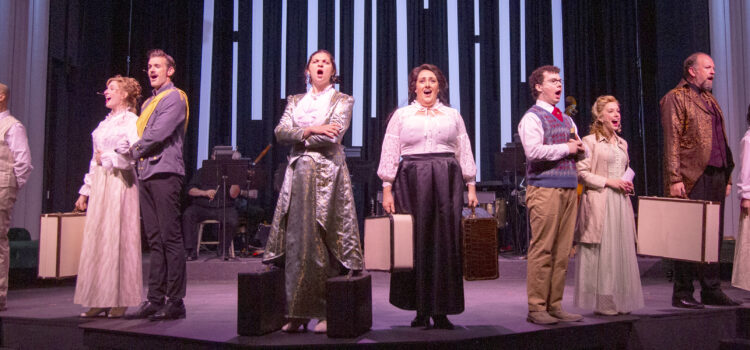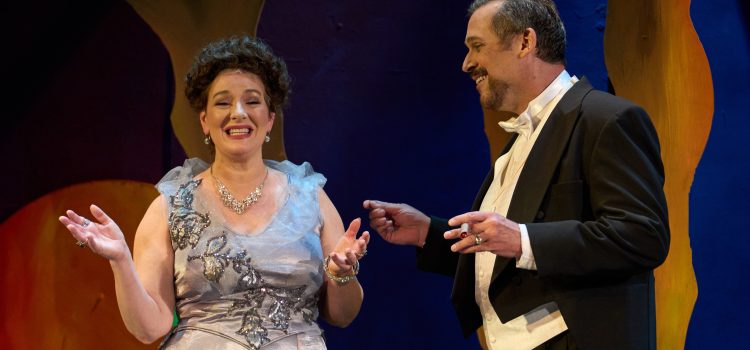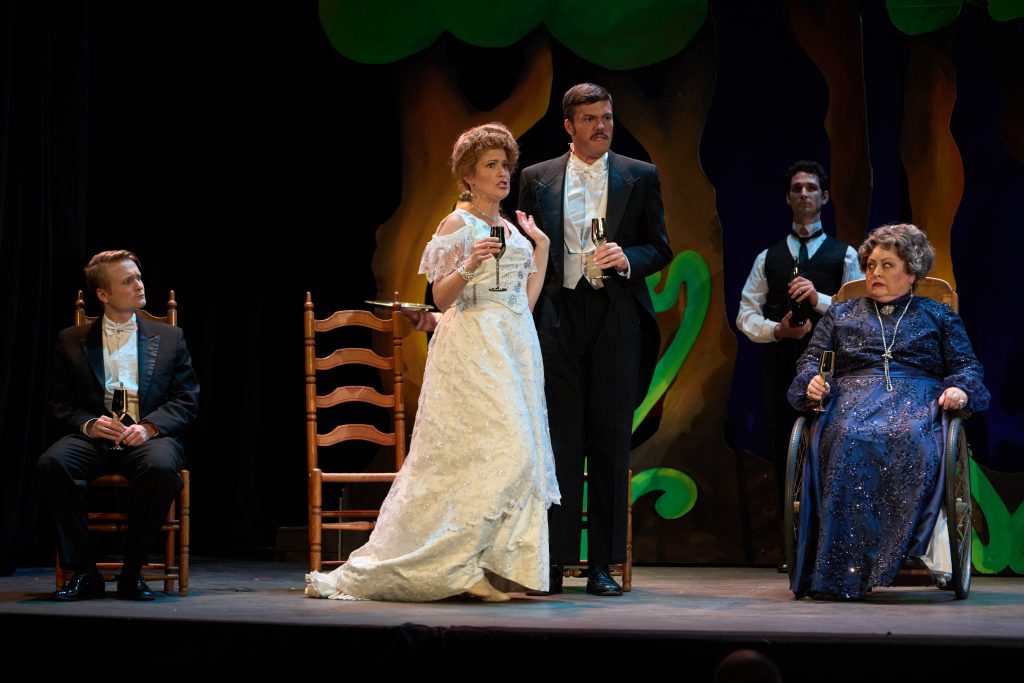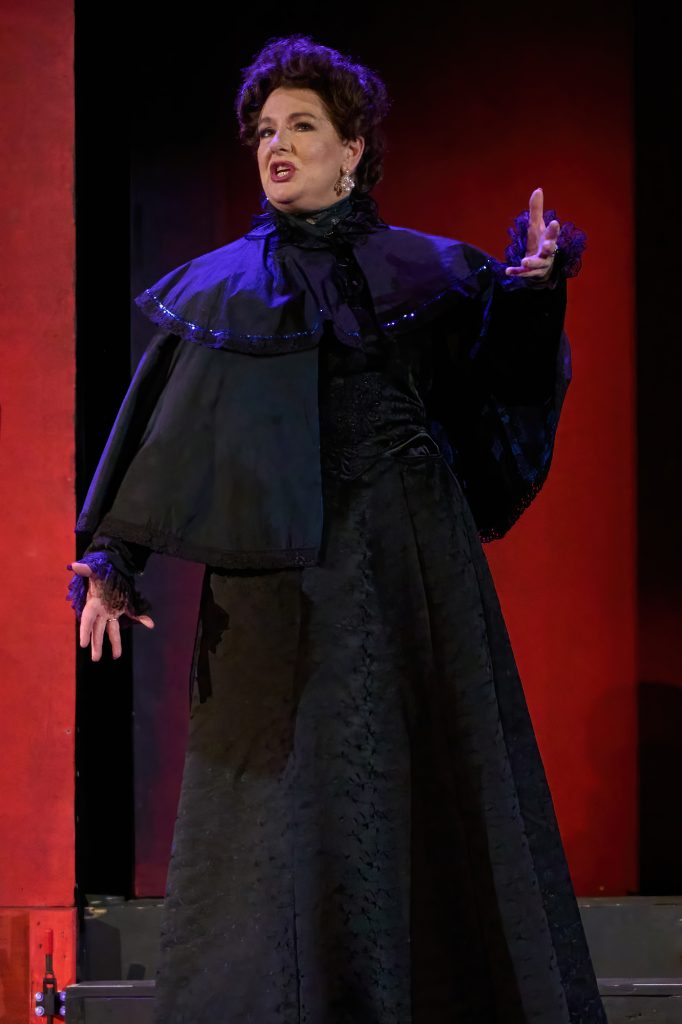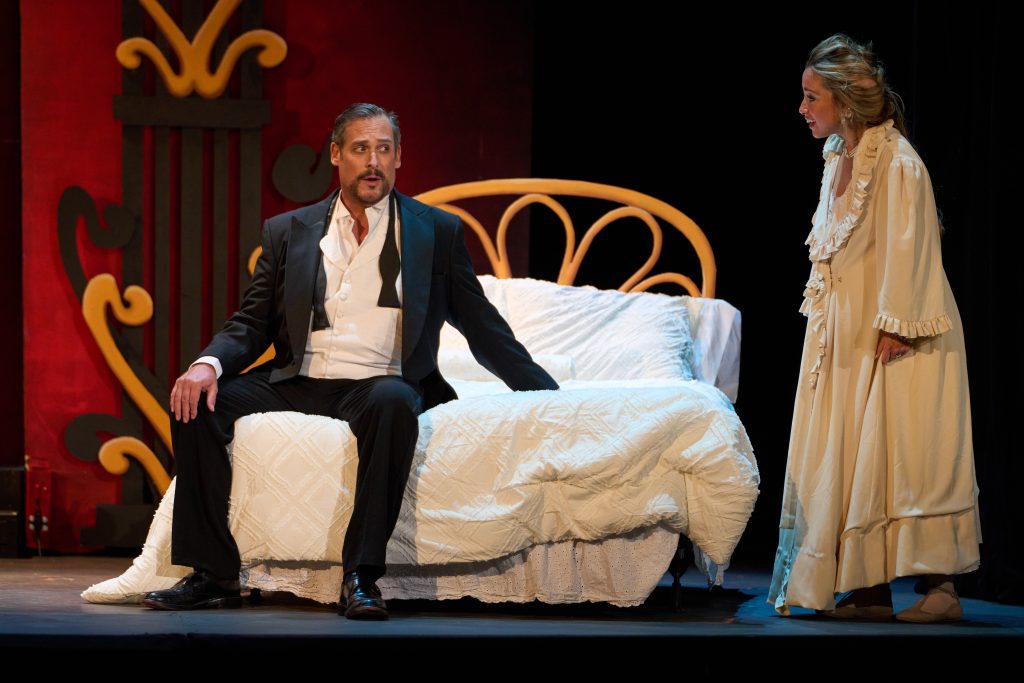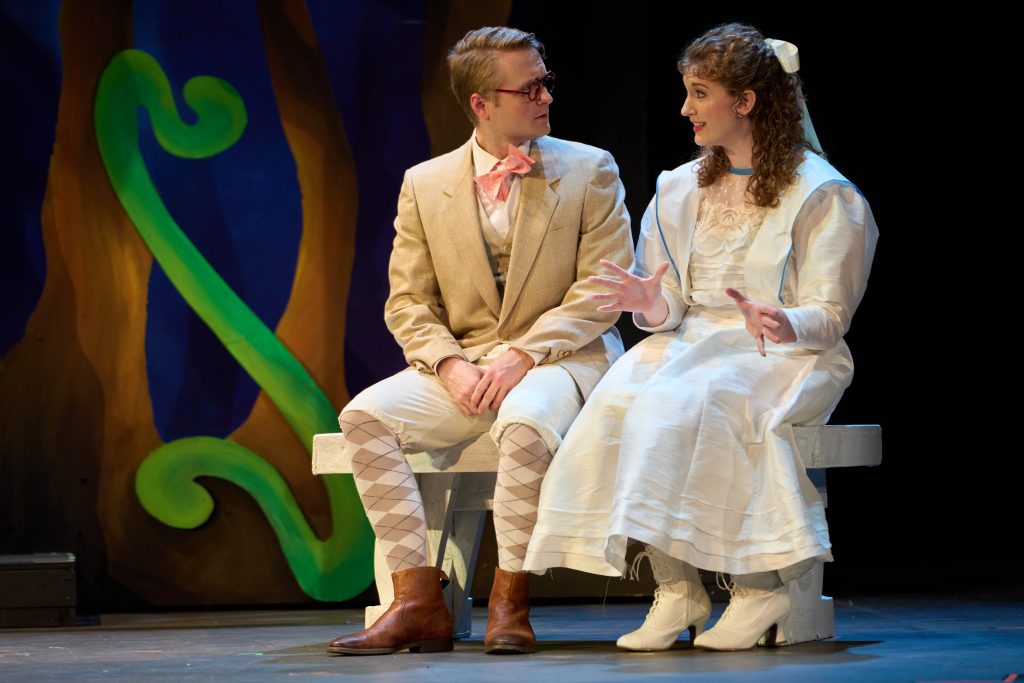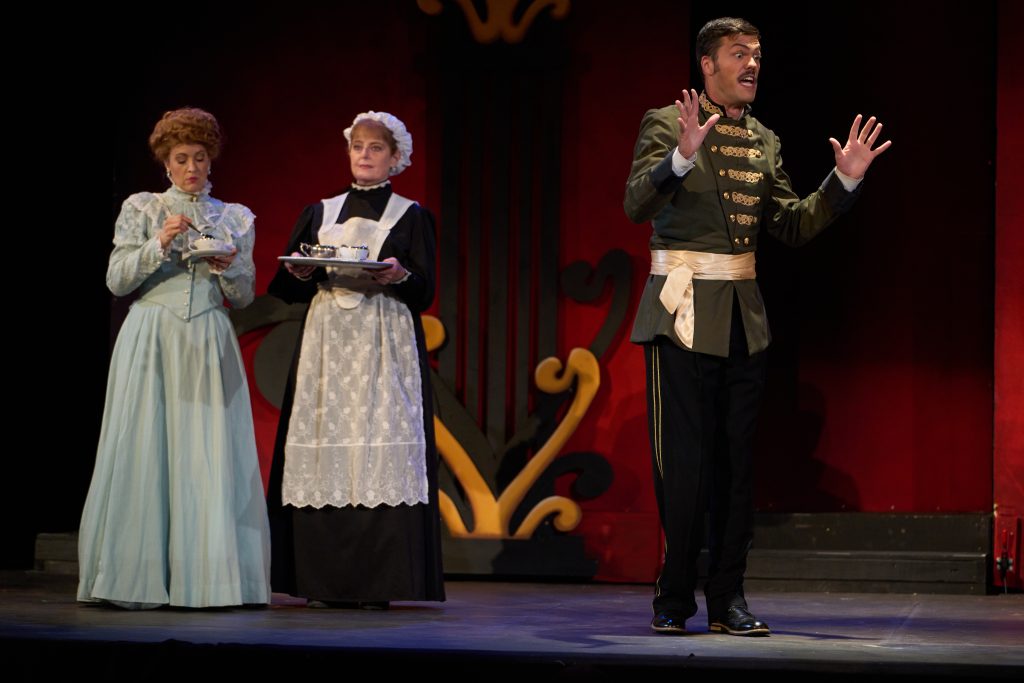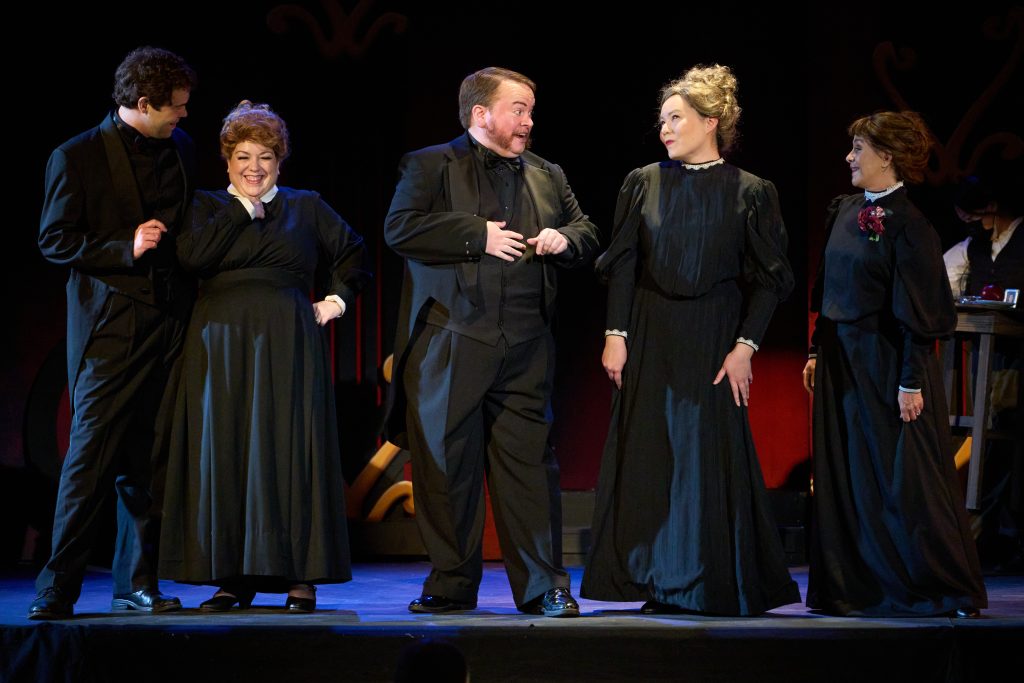By Lynn Venhaus
Infused with humor and a breezy charm, Stray Dog Theatre’s enchanting interpretation of Stephen Sondheim’s “A Little Night Music” brings out starlit summer imagery, the glory and glimmer of love, and the best in a resplendent cast.
On opening night, nature supplied a full moon on a crisp autumn evening outside the Tower Grove Abbey, a serendipitous touch. Imagine the golden glow of a warm, fragrant moonlit midsummer night – and you’ll easily slip into the mood for this sophisticated romp.
Set in Sweden at the turn of the 20th century, “A Little Night Music” concerns several pairs in various stages of romance or uncoupling – and what entanglements transpire during a summer sojourn in the country.
Liz Mischel is amusingly sarcastic as the unfiltered Madame Leonora Armfeldt, a wealthy matriarch who had colorful liaisons as a courtesan. She is schooling her innocent granddaughter Fredrika (a sweet and assured Adeline Perry) on the ways of the world – and men. She tells her the summer night ‘smiles’ three times: first on the young, second on fools, and third on the old.
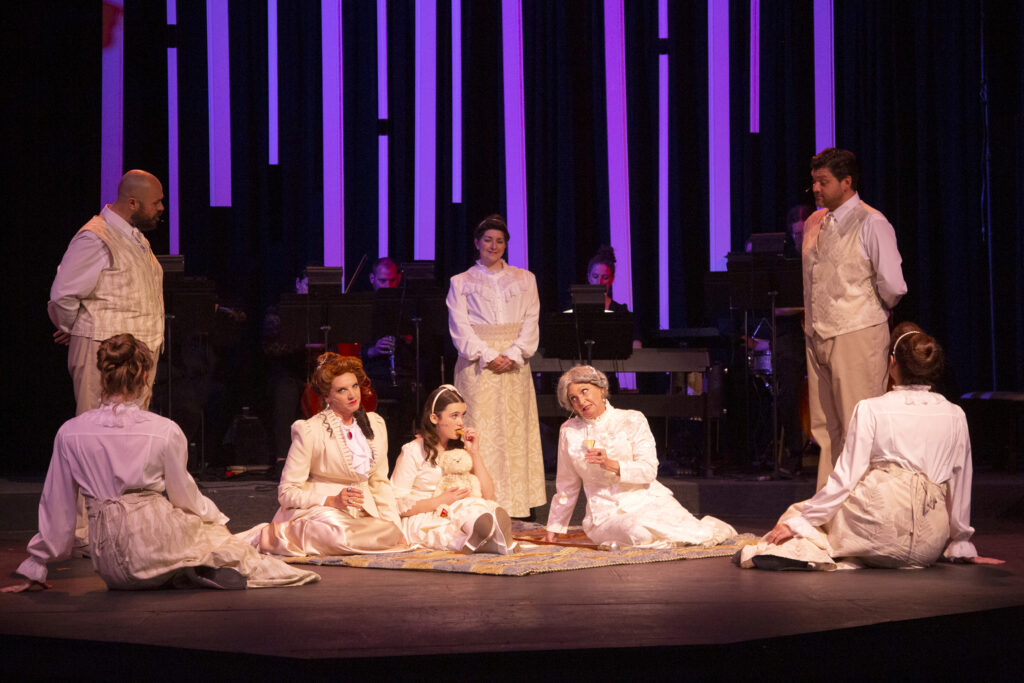
Madame’s daughter, the alluring, touring stage actress Desiree Armfeldt (Paula Stoff Dean) is a force of nature known for not playing by the rules. Her old lover, attorney Fredrik Egerman (Jon Hey), married a naïve young woman Anne (Eileen Engel) about 30 years his junior 11 months ago, and their union has not been consummated (her issues).
The coquettish but inexperienced wife teases her serious husband’s awkward son, Henrik (Bryce A. Miller), by his late first wife, who is studying for the ministry but has feelings for her, his stepmother. Although clumsy, he is not impervious to desire and has a dalliance with her maid, an older and wiser Petra (a brassy Sarah Gene Dowling making her character’s worldliness obvious).
Miller has to demonstrate the widest emotional range as the confused and ready-to-explode Henrik, and he effectively finesses the fine line between the melodramatic and the comedic to distinguish himself in a cast of veterans.
Desiree is currently the mistress of self-absorbed Count Carl-Magnus Malcolm (Scott Degitz-Fries), a buffoon whose jealous wife, Countess Charlotte (Madeline Black), is in on the charade. Degitz-Fries plays the military royal as an obnoxious, arrogant chauvinist who is not used to ‘no.’ Black channels her rage into a scheme – you know the adage about women scorned – but keeps her character’s refinement intact.
They all circle around and back to each other. Fredrik has taken Anne to see Desiree’s latest play, which eventually leads to an invitation for a country excursion. The complications culminate in the anticipation, flirting, fighting, and fleeing that takes place in the second act. Does love win in the end?
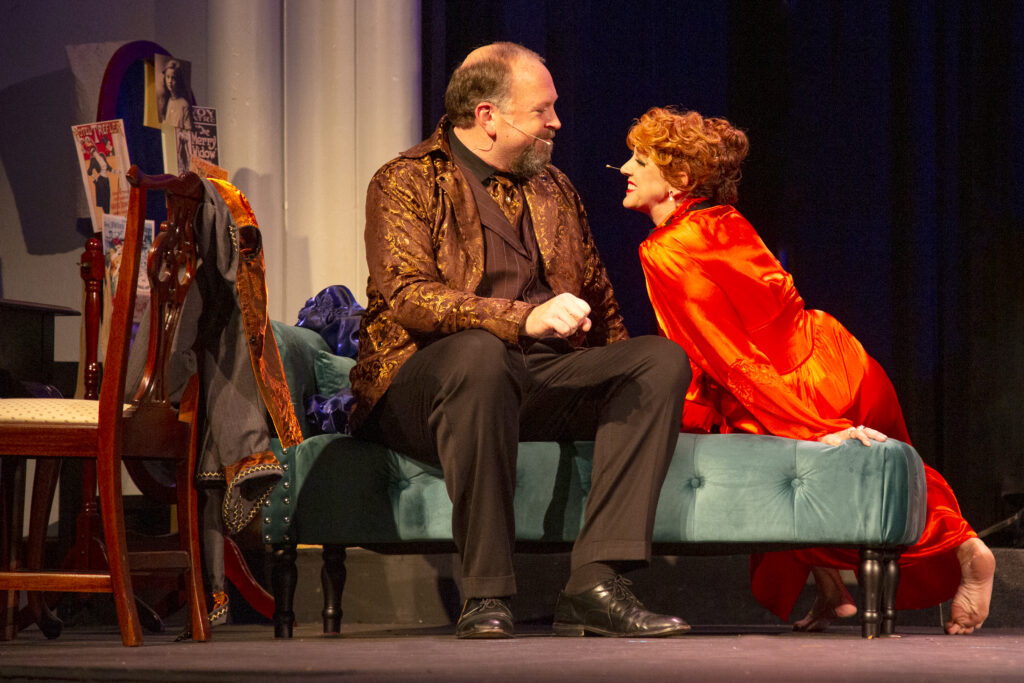
One look at the waltzing quintet in their summer whites that starts this elegant show, and you’re transported back to a different era. Splendidly delivering “Night Waltz,” Cory Anthony, Shannon Lampkin Campbell, Jess McCawley, Kevin O’ Brien and Dawn Schmid glide across the stage as the Liebeslieder Singers, astutely controlling the tempo.
They act like a Greek chorus, and their lush harmonies soar in “The Glamorous Life,” “Remember?” and “The Sun Won’t Set.”
The entire cast’s strong vocal prowess is noteworthy throughout, but a masterfully arranged “Weekend in the Country” is a triumph.
Dean has decided to belt the signature song, “Send in the Clowns,” instead of reciting nearly all of it, as others have done, and it’s a fine rendition. Another highpoint is Dowling’s “The Miller’s Son,” emphatically sung as a mix of longing and reflection.
Whether they are singing solo or in duets, or at the same time with different songs (“Now” by Fredrik, “Later” by Henrik and “Soon” by Anne), you’ll marvel at how seamless the numbers are performed.
Black and Engel lament together on infidelity, smoothly combining in “Every Day a Little Death,” and Degitz-Fries has his moment with “In Praise of Women.”
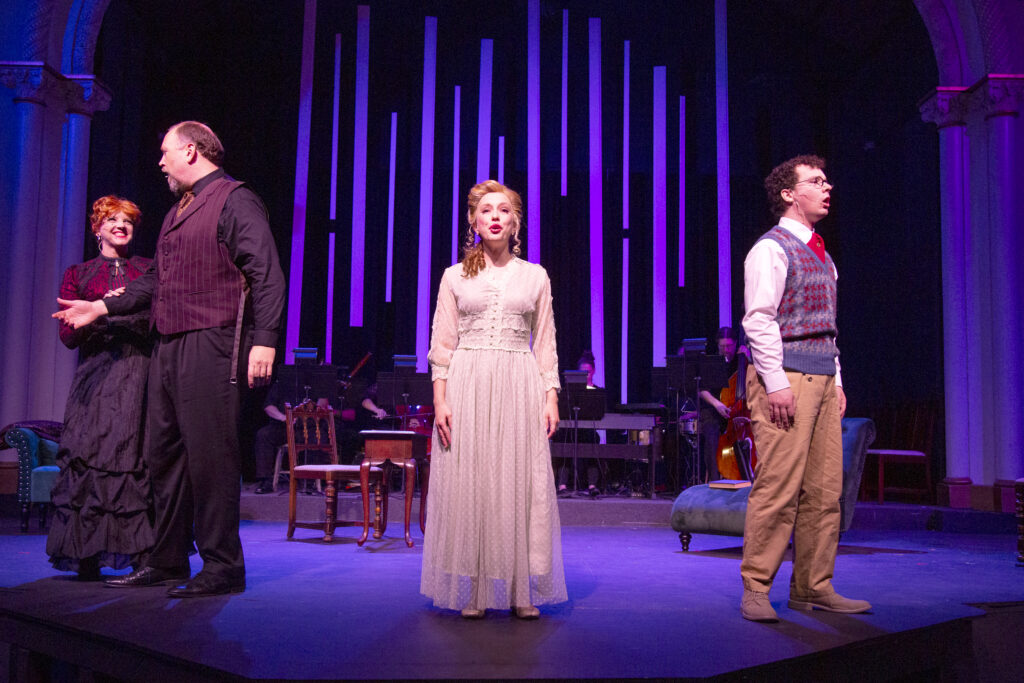
Employing the beautiful orchestrations of Jonathan Tunick, Music Director Leah Schultz uses three string players that elevate the sumptuous sound. The orchestra is prominently placed on stage, and their work is exquisite.
Schultz, also playing piano, expertly conducts the seven-piece orchestra that includes a cello (Michaela Kuba), a violin (Steve Frisbee) and a bass (M. Joshua Ryan), along with Ian Hayden and David Metzger on reeds and Joe Winters on percussion.
The way director Justin Been has shaken off the stodginess and stuffiness of a high society period piece is impressive. He’s embraced the farcical aspect of revolving romantic hook-ups, sleekly moving the characters through a country estate, the grounds, and an adjacent forest
Looking at the book by Hugh Wheeler with a fresh set of eyes gave it needed oomph, and the ensemble, nimble in comedy, conveys a playfulness that endears. Been has brilliantly adapted the very theatrical and somewhat operetta-ish work for the small stage.
The original 1973 Broadway production won six Tony Awards, including Best Musical, book, and score, and has had revivals in London’s West End and Broadway, adapted into a 1977 film starring Elizabeth Taylor, and has been performed by opera companies around the world – including this summer’s traditional format at Union Avenue Opera in St. Louis.
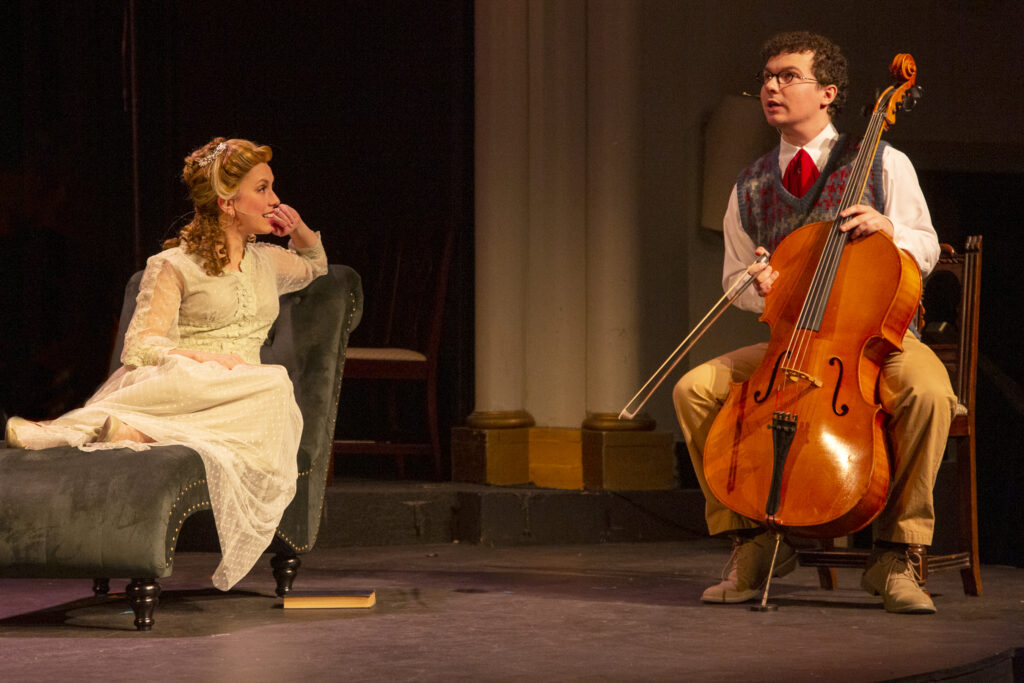
With a minimum of set pieces, Been has depicted the states of different affairs well. He designed modern Scandinavian impressionistic slats that hang above the orchestra, perhaps as a nod to magic realism. Jacob Baxley’s sound design and Tyler Duenow’s lighting design add to the imagery.
The creators claim the musical was suggested by Ingmar Bergman’s romantic comedy, “Smiles of a Summer Night,” which premiered in 1955, and is a staple at film retrospectives.
You might not think of Bergman as a merry sort of guy, particularly if you’ve seen his critically acclaimed classics “The Seventh Seal,” “Persona,” “Cries and Whispers,” and “Through a Glass Darkly.” But he mixed sugar and spice to come up with a confection that’s been ‘borrowed’ more than a few times. (Woody Allen’s 1982 “A Midsummer Night’s Sex Comedy,” to name one, which also references Shakespeare’s “A Midsummer Night’s Dream.”).
But this Bergman-inspired fantasia is much lighter, and Been has brought out the laughter, easy on the melancholy – yet has middle-agers expressing regrets.
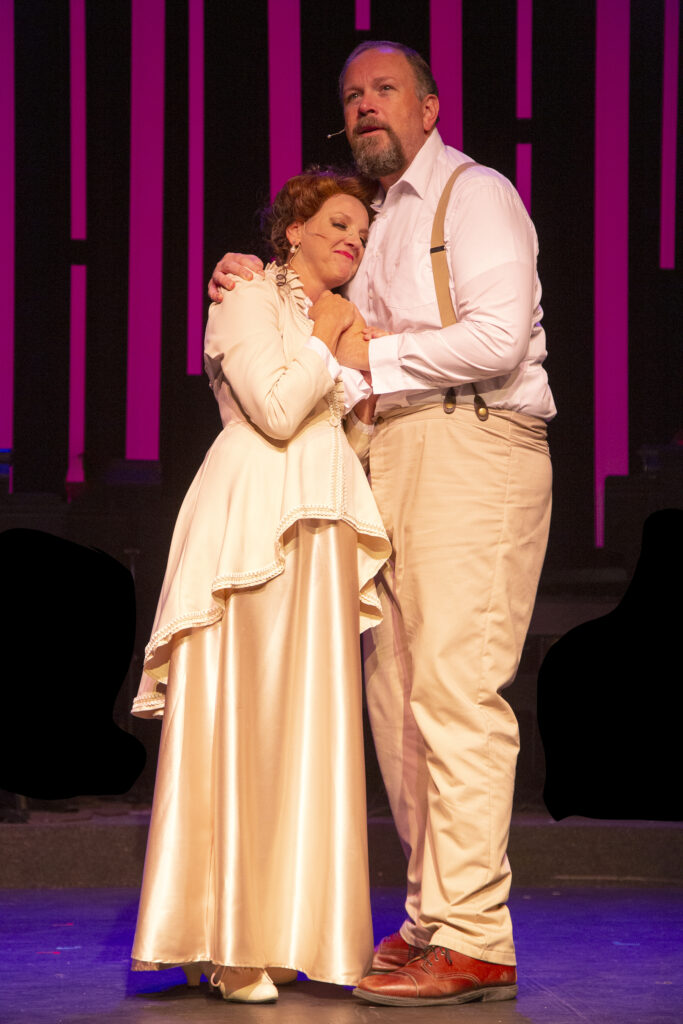
Hey, as Fredrik, and Dean, as Desiree, portray a rueful pair, looking back wistfully and rediscovering their spark. The accomplished actors display a natural rhythm with each other, especially in “You Must Meet My Wife.”
Like the music, the dance numbers are polished, choreographed by Michael Hodges with an emphasis on regal posture — although, at first, notice how awkward the pairings are – it’s on purpose, ahem).
Engel, who is delightful as the conflicted Anne, designed the costumes – and they are a mix of ethereal and chic, conveying the social status of each character. The hair and wig design by Dowling suitably complimented the looks.
Hey and Engel were part of Stray Dog’s “Sweeney Todd” in spring 2017, he in the title role and she as daughter Johanna, and know the challenges Sondheim presents, and their experience serves them well.
Sondheim’s work is getting a lot of posthumous attention – but that’s a good thing, never enough Sondheim done well. Like the recently revived “Into the Woods,” some of his musicals take on richer, more contemplative meaning as one ages and revisits them again.
Stray Dog’s superb “A Little Night Music” is worth the immersion, featuring a triple-threat cast in fine form and an inspired creative team.
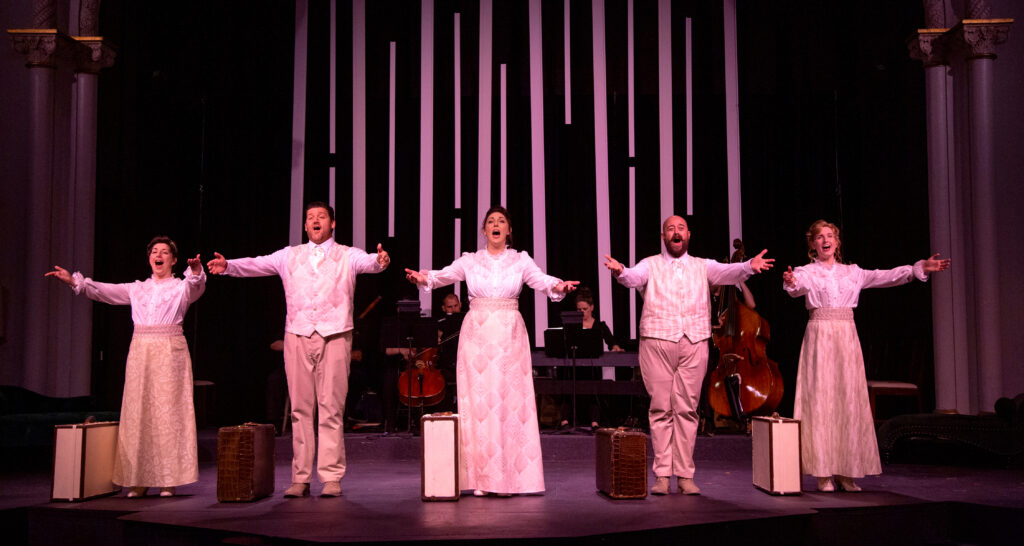
Stray Dog Theatre presents the Stephen Sondheim’s “A Little Night Music” at 8 p.m. Thursdays through Saturdays through Oct. 22, with additional performances at 2 pm Sunday, Oct. 16 and 8 pm Wednesday Oct.19. Performances take place at Tower Grove Abbey, 2336 Tennessee in Tower Grove East. Tickets are only offered in physically distanced groups of two or four. For more information: www.straydogtheatre.org
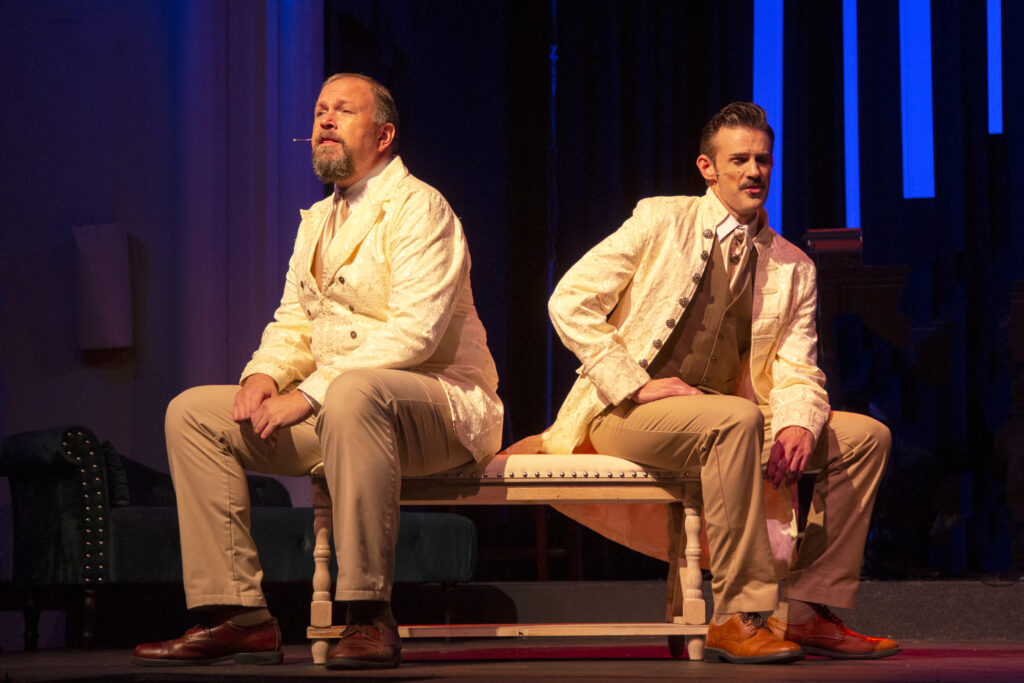

Lynn (Zipfel) Venhaus has had a continuous byline in St. Louis metro region publications since 1978. She writes features and news for Belleville News-Democrat and contributes to St. Louis magazine and other publications.
She is a Rotten Tomatoes-approved film critic, currently reviews films for Webster-Kirkwood Times and KTRS Radio, covers entertainment for PopLifeSTL.com and co-hosts podcast PopLifeSTL.com…Presents.
She is a member of Critics Choice Association, where she serves on the women’s and marketing committees; Alliance of Women Film Journalists; and on the board of the St. Louis Film Critics Association. She is a founding and board member of the St. Louis Theater Circle.
She is retired from teaching journalism/media as an adjunct college instructor.

